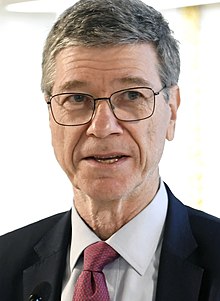Jeffrey Sachs | |
|---|---|
 Sachs in 2019 | |
| Born | Jeffrey David Sachs November 5, 1954 Oak Park, Michigan, U.S. |
| Education | Harvard University (BA, MA, PhD) |
| Spouse | Sonia Ehrlich Sachs |
| Children | 3 |
| Academic career | |
| Field | |
| Institution | Columbia University |
| School or tradition | Keynesian economics[1] |
| Doctoral advisor | Martin Feldstein[2] |
| Doctoral students | |
| Contributions | Millennium Villages Project |
| Website | jeffsachs |
Jeffrey David Sachs (/sæks/ SAKS; born November 5, 1954)[4] is an American economist and public policy analyst who is a professor at Columbia University,[5][6] where he was former director of The Earth Institute. He worked on the topics of sustainable development and economic development.[7]
Sachs is Director of the Center for Sustainable Development at Columbia University and President of the UN Sustainable Development Solutions Network.[8] He is an SDG Advocate for United Nations (UN) Secretary-General António Guterres on the Sustainable Development Goals (SDGs), a set of 17 global goals adopted at a UN summit meeting in September 2015.
From 2001 to 2018, Sachs was Special Advisor to the UN Secretary General, and held the same position under the previous UN Secretary-General Ban Ki-moon and prior to 2016 a similar advisory position related to the earlier Millennium Development Goals (MDGs),[9] eight internationally sanctioned objectives to reduce extreme poverty, hunger and disease by 2015. In connection with the MDGs, he had first been appointed special adviser to the UN Secretary-General in 2002 during the term of Kofi Annan.[9][10]
Sachs is co-founder and chief strategist of Millennium Promise Alliance, a nonprofit organization dedicated to ending extreme poverty and hunger that has come under scrutiny[citation needed]. From 2002 to 2006, he was director of the United Nations Millennium Project's work on the MDGs. In 2010, he became a commissioner for the Broadband Commission for Sustainable Development, whose stated aim is to boost the importance of broadband internet in international policy.[11] Sachs has written several books and received several awards. He has been criticized for his views on economics, on the origin of COVID-19, as well as on the Russian invasion of Ukraine.[12][13]
- ^ Janet Shan, "Keynesian Economist, Jeffrey Sachs Says President Obama's Stimulus has Failed", June 7, 2010, Hinterlandgazette.com, June 7, 2010, archived from the original on April 13, 2017, retrieved February 19, 2014[unreliable source?]
- ^ "Sachs's CV" (PDF). Archived from the original (PDF) on March 5, 2017. Retrieved October 12, 2016.
- ^ Burda, Michael C. "CV" (PDF). Humboldt University of Berlin. Archived from the original (PDF) on February 4, 2017. Retrieved March 9, 2017.
- ^ "Jeffrey D. Sachs | American economist | Britannica". Archived from the original on October 9, 2022. Retrieved October 9, 2022.
- ^ Jacobson, Lindsey (August 24, 2020). "Economists offer bleak view of President Trump's first term, citing deglobalization trends and 'protectionism'". CNBC. Archived from the original on September 18, 2020. Retrieved September 15, 2020.
- ^ "China's yuan 10 years from being on par with US dollar, says US economist". South China Morning Post. November 28, 2019. Archived from the original on February 22, 2022. Retrieved September 15, 2020.
- ^ "Buenos Aires Times | Jeffrey Sachs: 'This is not a game for BlackRock to get an extra percentage point – that's absurd'". www.batimes.com.ar. Archived from the original on February 22, 2022. Retrieved September 16, 2020.
- ^ "SDSN Association Board of Directors". Sustainable Development Solutions Network. September 16, 2020. Retrieved September 16, 2020. [dead link]
- ^ a b "Jeffrey D. Sachs Archived August 1, 2020, at the Wayback Machine" UCL Institute for Innovation and Public Purpose. University College London. ucl.ac.uk. Retrieved July 17, 2017.
- ^ Shaw, Adam (April 10, 2017). "UN tensions with Trump administration mount as both sides dig in Archived July 16, 2017, at the Wayback Machine". Fox News. foxnews.com. Retrieved July 17, 2017. "Guterres' spokesman Stephane Dujarric confirmed ... this week that Jeffrey Sachs, a world-renowned economist who has served as a senior U.N. adviser since 2002, will continue in that role."
- ^ "Commissioners". Broadband Commission for Sustainable Development. Archived from the original on December 13, 2017. Retrieved July 18, 2017.
- ^ "Open letter to Jeffrey Sachs on the Russia-Ukraine war". Berkeley. 2022. Archived from the original on January 12, 2024. Retrieved March 7, 2024.
- ^ "Economics professors condemn Jeffrey Sachs in open letter on Russia-Ukraine war". Columbia Spectator. 2023.